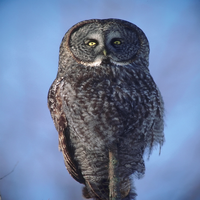Larks, Owls and Depression

It is well known that mood disorders are associated with the disruption of many of the circadian rhythms of the body including sleep, temperature and thyroid function. These links are so well known that many experts believe that depression may be a consequence of disturbances in circadian rhythms.
Although circadian rhythms tend to be fairly consistent across individuals, but there are significant differences in these rhythms in different people: we call this the “morningness-eveningness” dimension (MED).
As part of a larger project, researchers from Providence, Rhode Island last month presented a most interesting study (NR293) at the 2007 Annual Meeting of the American Psychiatric Association in San Diego.
People with psychiatric problems tend to be owls: evening types who don’t like mornings, and this was particularly striking in people with depression.
This suggests that “eveningness” may be reflecting a risk factor or vulnerability to psychopathology, in particular depression. It may actually be that if you are a “morning person,” you may have some protection against developing depression.
I remember seeing a study from Stanford in April that suggested that people labeled a “night owls” report more pathological symptoms related to insomnia, despite many having the opportunity to compensate for their nocturnal sleeplessness by extending their time in bed and being able to gain more total sleep time. So this may be the link with depression.






